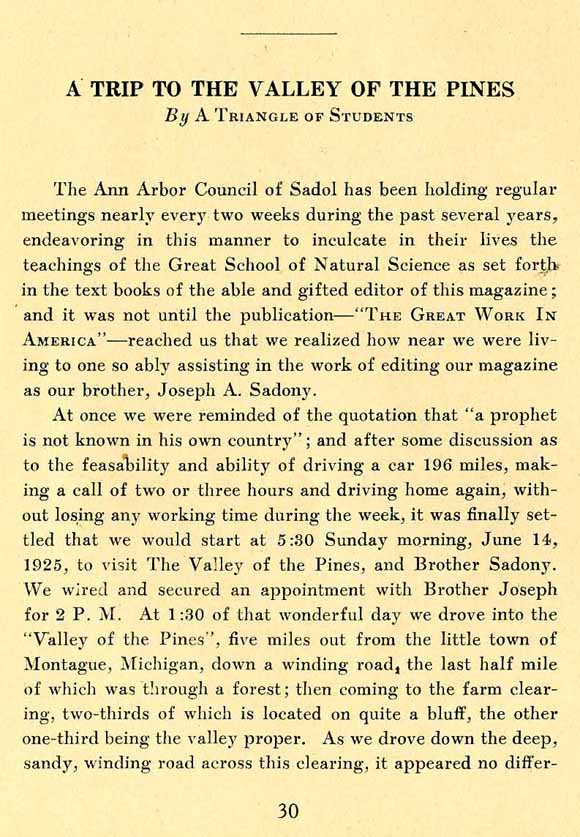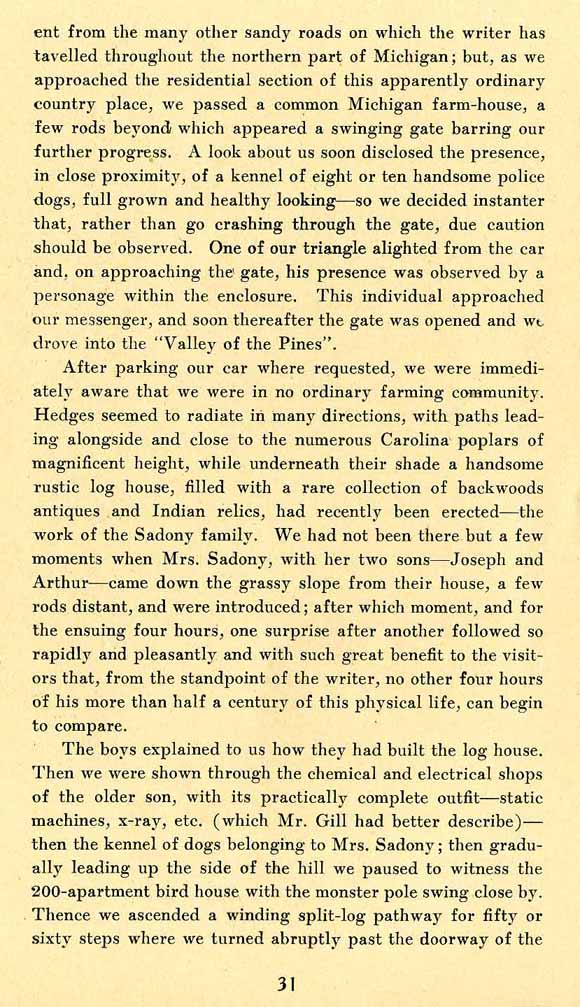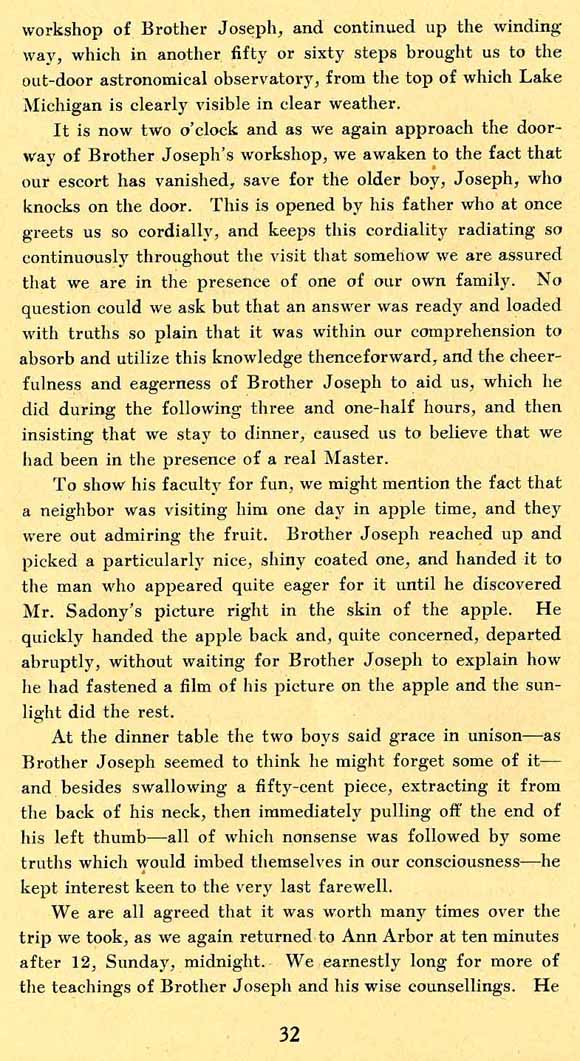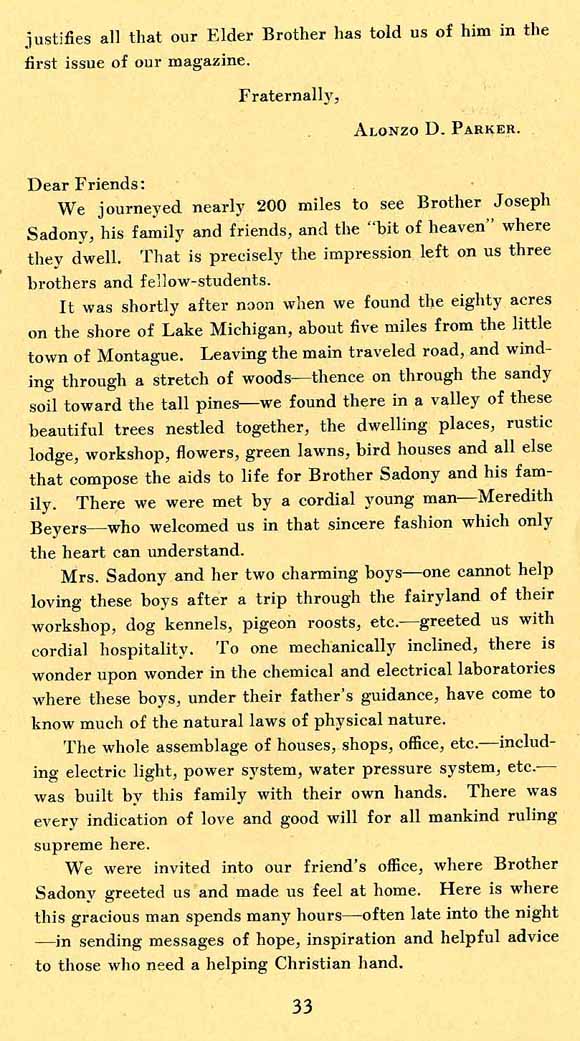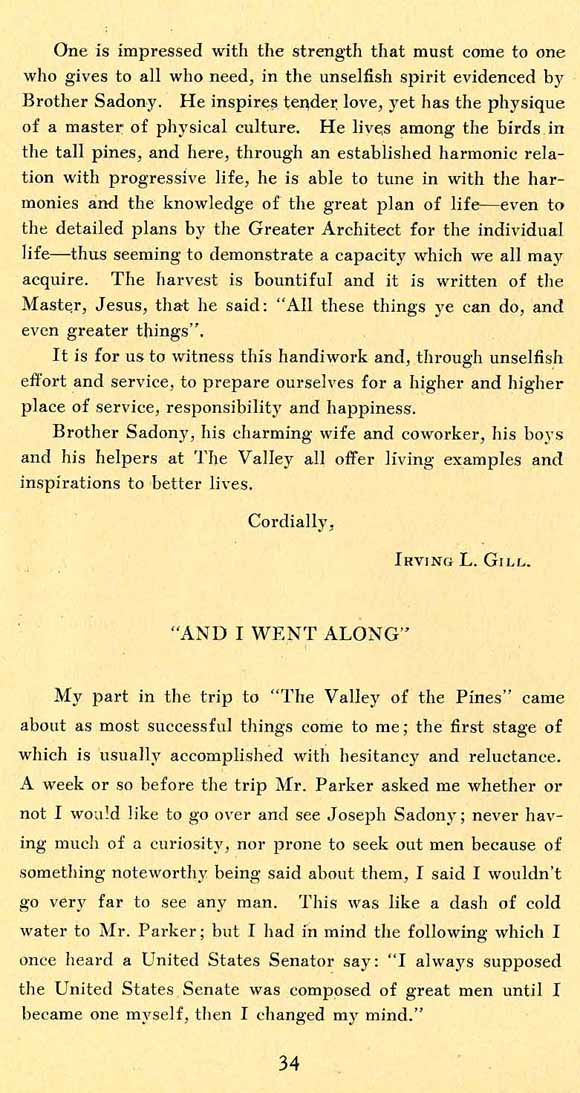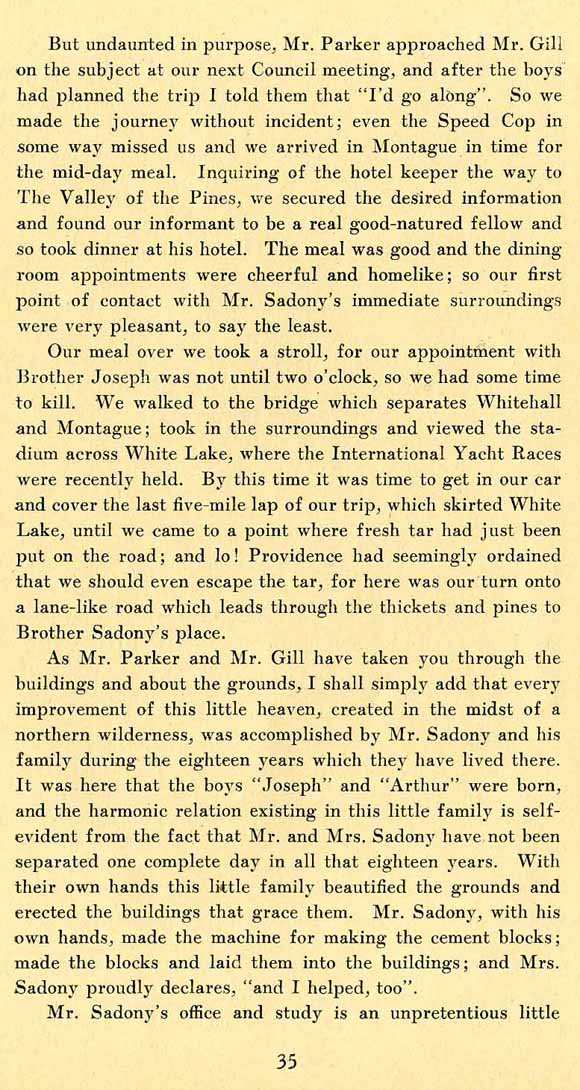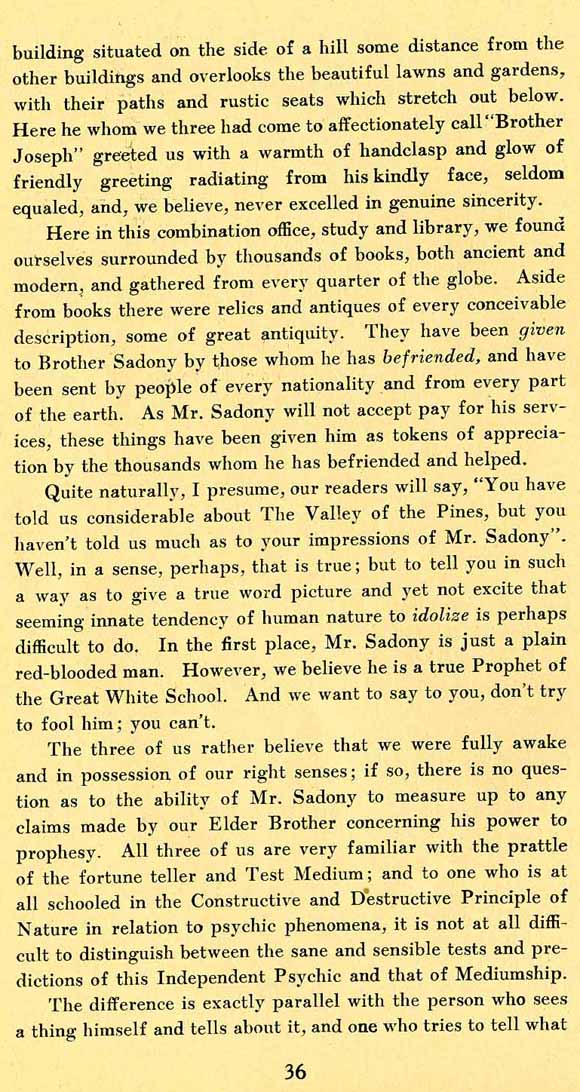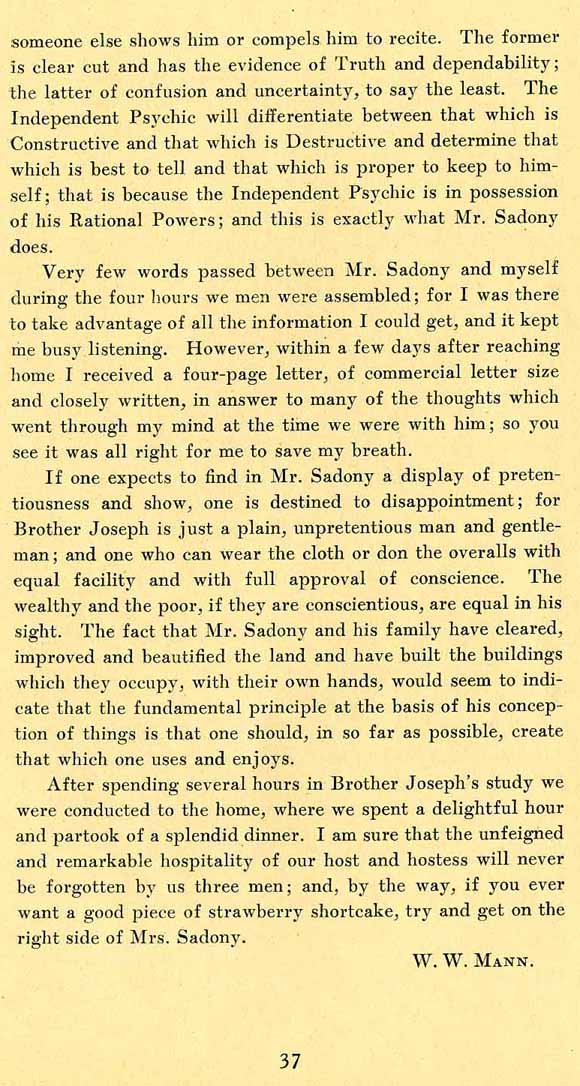An Introduction to Franklin Merrell-Wolff
From a preface written by Dr. Richard Moss. See my full review of Franklin Merrell-Wolff for more information.
When I recommended the writings of Franklin Merrell-Wolff to publisher Yvan Amar some years ago, I did not know that I would one day have the honor of writing this forward to introduce Dr. Wolff to the French public. The book you are about to read is the most eloquent description of the awakening process I have ever come across. It is a statement charged with the immediacy of direct personal experience, remarkable in its eloquence, depth and clarity. And because I feel it needs no interpretation by me, what I shall undertake to offer the reader, and rejoice in doing so, is a small sketch of Franklin Merrell-Wolff, the man. He was someone I knew for nine years and grew to love. To this day, I value our relationship as I value Truth itself.
Franklin Merrell-Wolff’s life began in the late Nineteenth century and spanned most of the Twentieth. He was an American philosopher, mathematician, sage, and mystic. His conscious spiritual quest began in his early twenties while studying mathematics at Harvard. There he attended a series of lectures on Vedanta given by Vivekananda, a disciple of the great East Indian saint, Sri Ramakrishna [a reader pointed out to me that Vivekananda died in 1902. He did lecture at Harvard in 1896, so perhaps Merrell-Wolff read a transcript of the lecture – SN]. Vivekananda was one of the first of the Indian sages and scholars to bring Eastern teachings to the West. The young mathematician came away from those lectures profoundly moved. He was convinced that if there was a transcendent reality, it could not be merely accepted as an intellectual fact. He made the decision, there and then, to renounce his academic career and completely devote his life to confirm this truth for himself. The story of that confirmation–the event that became the basis for his philosophy and nearly half a century of his teaching–is the subject of this book.
Dr. Wolff, as he liked to be called, or Yogi as some of his students affectionately referred to him, was eighty-nine years old in 1977 when I first met him. I vividly recall that first meeting. It was only hours after the onset of the enormous energetic opening that would change my life forever. I was in a nearly overwhelming state of openness and while I had not consciously come in search of a teacher for myself, life in its intelligence was providing one. Suddenly, I was in the presence of this man whose very being brought calm to the forces.
It had been a small pilgrimage to visit him that first time. The journey began some months before when I wrote requesting a meeting after reading Pathways Through to Space. His wife had written back confirming a date and including the directions to their home. They lived on the eastern side of the Sierra Nevada, the great range of mountains that divide the fertile western regions of California from the high desert that stretches east for a thousand miles. The trip had taken the better part of two days to drive from San Francisco.
Leaving the small desert town of Lone Pine behind, I began to climb toward the base of the Sierra. As I drove the last miles up a washboard dirt road, I was stunned by the view. On either side stretching north and south for as far as the eye could see lay thousands of hectares of sage and scrub growth. In front of me to the west, the late afternoon light silhouetted the majestic escarp of the High Sierra and the fanning spread of the sun beams gave me the distinct feeling of entering a great natural cathedral. Behind me to the east, the land sloped gently downhill, descending over two-thousand feet to the base of the Owens Valley and then rising again to the soft contours of a second range of mountains, the older Inyos. With 14,000 foot peaks on either side, Owens Valley is the deepest valley in the United States. I had driven about a dozen miles in this vast empty landscape without a dwelling in sight when seemingly, in the middle of nowhere, appeared a simple gate with an aging sign: Association of Man Ranch. I passed through it.
Bouncing over and around boulders along a barely usable road, I soon drove past a small cluster of houses and an old orchard nearly reclaimed by the desert. I knew from Dr. Wolff’s directions that these were the homes of some of his oldest students. In another half mile, the road came to an end. There sitting alone, nestled in a small oasis of trees and twittering birds was a simple white, one-story house. There were no telephone lines, no power lines. As I stood on the front porch, I could see for over a hundred miles to the north and south. The other houses were now invisible, swallowed by the undulations of this vast landscape.
The door was opened by Gertrude, Dr. Wolff’s second wife, a woman in her late seventies. She graciously invited me inside. The house was crowded with books, paintings, photographs, antique furniture, a grand piano, and it was very warm. I could hear the purr of a diesel generator, their source of electricity. I soon learned that one of Dr. Wolff’s on-going challenges was to keep the temperamental machine running. They used it for a few hours each night for light and to enable Dr. Wolff to watch the evening news on television. He took this basic responsibility of maintaining some awareness of current affairs very seriously. He believed that such awareness on the part of a person of realization lent some degree of stability to the world.
But to return to that first encounter, the man who emerged from his study to greet me immediately impressed me with his sense of dignity. I noticed that his walk was a little unsteady, but there was no mistaking the vitality in his eyes. He was eighty-nine years old at the time. He had a trim beard that came to a sharp point below his chin and a full head of dark gray hair. He was wearing a tie and a rumpled and somewhat threadbare dinner jacket. I would learn that he always dressed this way even when relaxing alone in his home. But the most unusual quality about him, which deserves special remark, was his deep voice and the old-world elegance of his use of language. He spoke very slowly, carefully enunciating every word. It was soon evident that he used a rich vocabulary, very precisely and sparingly, even in ordinary conversation.
And then he pulled out a cigarette, which somewhat surprised me. It was an unfiltered Pall Mall, as potent a cigarette as exists in America. He carefully fit the cigarette into a plastic holder that contained a filter and with a slight tremor, lit it. Even smoking took on a sense of refinement with this man. In those days I still enjoyed an occasional cigarette. Not having any of my own with me, I asked him if I might have one too. Quite willingly, he passed the pack to me and then with the wry, sardonic humor I came to love so much, he remarked, “More friendships are based on commonality of vice, than on commonality of virtue.” I knew I was going to like this man.
I learned that he and Gertrude had built this house themselves when Dr. Wolff was already seventy-eight years old and she was in her sixties. She designed it and he cleared the site and did most of the construction, even the plumbing and electrical wiring, with help from some of his students. This was just after Sharifa, his first wife to whom he had been married for more than forty years, had died. It was with Sharifa that he had begun and developed most of his teaching work. But after her death, a strange phenomenon occurred which he described as etheric hemorrhaging. He felt certain that if he could not contain this energetic bleeding, he would die. To his relief, this energy loss stopped when he was near Gertrude who was one of his students. When they decided to marry it caused controversy in the community as she was not considered one of the more advanced disciples. But for him it was a matter of necessity. Not wanting to live in the house he had shared for so long with Sharifa, they chose to build a new home on the ranch.
The original decision to move to such a remote place had been made by Dr. Wolff and Sharifa in the late 1920’s when Hazrat Inayat Khan, a Sufi sage, told them that the spiritual center of a country was its highest mountain. At that time, Mt. Whitney was the highest peak in the forty-eight states. They had chosen this ranch because it would bring them as close as possible to it. Relaying this bit of his history, he then laughed at the tricks life plays. How could they have known at the time that Alaska would later be admitted to the Union becoming the forty-ninth state and bringing with it a new highest summit, the great Denali?
In 1982, five years after that first visit, I purchased a ranch in Lone Pine which became the center for my own teaching work. From that point on I saw Dr. Wolff quite regularly and learned much more about his life. He was born in California in 1888 and as a child he used to travel to church for two hours by buckboard with his father, a Lutheran minister. He did his undergraduate studies in philosophy at Stanford University, and then continued his study of mathematics at Harvard. During World War I, he was a conscientious objector who worked as a medic. His family owned large tracts of orchard land along the coastal areas north of Los Angeles, and in a mostly arid valley known as the San Fernando. Later this same valley would receive water via a controversial aqueduct making the land extremely valuable first as a great citrus growing area and later as suburbs for the rapidly expanding Los Angeles. It was by gradually selling parcels of this land after moving to Lone Pine, that Dr. Wolff supported himself financially. Indeed, from his late thirties until his death at the age of ninety-eight, he never needed to work for money. Good karma, I guess.
Earlier, during the Great Depression of the 1930’s, Dr. Wolff spent long periods alone in remote parts of the California foothills mining for gold. His mining efforts were relatively successful as he managed in this way to support Sharifa and himself and protected their property from forced sale. During this period he learned how to work with dynamite and rock. This skill would prove invaluable later when he and his students began the long undertaking to construct a sacred site he called the Ashrama. It was meant to be the center piece of their school. The Ashrama is a remarkable building made of hand-laid granite rocks constructed in the shape of a balanced cross, like a Red Cross emblem, fifteen meters in width. Built at 2800 meters altitude, it perches on the top of a ridge in the mountains high above the ranch on land leased from the National Forest Service. Each summer for over twenty years his students came to Lone Pine to work on the Ashrama with Dr. Wolff and Sharifa. It took eight years just to build the trail and the small aqueduct that routes water to the site and thirteen more years to complete the walls and roof.
Dr. Wolff took pleasure in remembering that the dangerous task of working with explosives fell to him as he was the only one with any experience. One of his students from those days recounted how Dr. Wolff, who was already in his late fifties when the project was begun, could exhaust four men at a time. Their task was to mix cement and gather appropriate sized rocks, while he single handedly set each stone of the great walls and massive fireplace into place. Working in such a setting, without electricity or running water, using mules to haul equipment and food, must have been an extraordinary initiation into a teaching about Fundamental Realization. On Sundays they would rest and Dr. Wolff and Sharifa would give talks, presenting the formal teaching. I have seen old film footage without sound, of course, of the construction of the Ashrama with vignettes of some of the Sunday teaching gatherings. The students themselves, also made presentations, and there were small concerts, and theater productions. This was how Dr. Wolff worked with his students.
Ultimately, the Ashrama was never fully completed. When Sharifa grew too old to make the arduous horseback ride-she was thirteen years older than Dr. Wolff-he abandoned the work. After she died, he never again visited it. I asked him about this and he said that it had been a means of sharing the teaching. With Sharifa gone, that form was finished. He felt no attachment to it. Over the years, hunters began to use it for their base camp and tore apart the wood interior to make fires. Slowly the Ashrama was falling to ruin. Around 1980 the United States Forest Service condemned it for demolition, but a group spearheaded by his grand-daughter, rebuilt the roof and petitioned to have the Ashrama preserved as a historical religious shrine. This was eventually granted, and the building still stands.
During the 1980’s, I regularly led groups up to the Ashrama for special ceremonies and rituals. I also would bring a few students to visit Dr. Wolff. As a very old man, it was remarkable to watch him become focused and invigorated on these occasions, especially in the presence of certain women. He would literally draw on their shakti in a kind of delightful mutual seduction of spirit and soul. It always gave me great pleasure to observe his vitality return as he responded to their attention. At such times one could feel a little of the old fire that had been so strong when he was in his full powers earlier in his life.
I know that Dr. Wolff had some frustrations about his teaching work, and that Sharifa was very impatient with the students; she thought many of them worthless and was prone to tell them so. For himself, he never really understood why the students would continue to engage what he felt was the lesser emotional dramas of their lives. He wrote in a personal journal that I only saw after his death, that it would be his preference, like Hercules’ task to clean the Aegean Stables, to take a great river of energy and wash the students clean all at once. But this did not seem to work for very long. The students would be inducted into higher states by his strong presence, expand their vision for awhile, but they could not maintain it. It was his fear that he would have to enter the stable with them and he wondered whether doing so would mean perhaps sacrificing or otherwise diminishing his own state.
I don’t believe he actually ever did enter the stable. His approach was mostly through the conceptual. He offered those who would listen a clear map of higher consciousness. His teaching and insight draws primarily from his own realization and from Buddhism, Mystical Christianity, and the work of Sankara who he regarded as the greatest influence on his own thought. But he never really developed any practical teaching for helping students understand and work with their emotional and psychological dynamics even though he saw that this was where most people were caught. One came to Dr. Wolff to experience the clarity of his mind and the unquestioned purity of his heart. And, of course, there was his presence.
In the years that I knew Dr. Wolff up until the very end of his life, every Sunday he opened his home to students or anyone pursuing the Perennial Wisdom. The only exceptions to this ritual were those few days when he was ill or when he went on his yearly visit to the redwood trees of the northern California coast which he so cherished. At precisely 10 A.M. (one of his eccentricities was that he never changed his clocks for Daylight Savings Time), he would put on his black professorial gown and slowly amble to his special chair. There after a few minutes of silence he would turn on an old reel to reel tape recorder and play one of about sixty lectures that he had dictated while he was in his early eighties. They are scholarly and insightful discourses on everything from Blavatsky and Theosophy to Sankaracharya, from Buddhism to mystical Christianity, from Love to the High Indifference, the latter, as you shall read, being the apex of his own realization. The necessity for taped presentations grew from his recognition that he no longer had the strength to speak extemporaneously.
For the most part in these discourses his voice is emotionless, each word is slowly and carefully enunciated, each thought perfectly linked to the next. But occasionally when he was recounting key moments of his own awakening or invoking the solemn responsibility accepted by a disciple of truth, his voice would fill with emotion and his words carried a profound invitation. It seemed to me at these times, that he had tapped, once again, into some of the energy of his original recognition. Often as the tape recorder played, he would fall asleep with the ash growing longer and longer at the edge of his cigarette. And with the hypnotic quality of his voice, and the heat of the room, it was sometimes difficult for me and others to stay awake, as well.
I questioned myself about why I came to see Dr. Wolff at these Sunday gatherings in his extreme old age, often hearing the same taped discourse over again. The answer was that I loved him and by being present I honored his lifelong commitment to Truth and to the Teaching. I respected him as my predecessor in the lineage of spontaneous realization. He did not believe in founding a school to survive him; he asked no one to carry the mantle of his work. He felt that the full reality of realization could not be passed from one man to another, that a realized person could assist a student in many essential ways, but realization had to come spontaneously of itself as it had for him. And when it came each person would express it uniquely. For him this was the tradition of enlightenment that is ever renewing, that stands outside all dogma, that can never be institutionalized.
Dr. Wolff was very private about his personal life. It was only after his death in 1985 that a few of us had an opportunity to enter his bedroom. Gertrude had died seven years earlier, and we were touched to see that her personal things, her hair brush and jewelry, were still sitting on her bureau exactly as she had last left them. To me it was as though Gertrude was still with him; a relationship that perhaps had begun from necessity, had grown into deep love and mutual respect. Indeed, within days of her death, he had had a heart attack and didn’t want to live any longer. But a clairvoyant who he had known and respected for many years channeled a message from one of the Ascended Masters saying that his presence on Earth was still needed. These beliefs, part of his earlier years in the Theosophical movement, were very serious to him. Upon hearing this he immediately recovered, saying, “One does not refuse the call.”
It was also soon after his death, while organizing his private papers, that we came across some of Sharifa’s journals. They are quite remarkable in that she writes about the energetic phenomenon at the time of his realization from her point of view. She describes the distinct feeling that she was suddenly living with a divine being. The energy pouring from him was so powerful that it regularly inducted her and his other students into states of extraordinary ecstasy and peace. Even more poignant was her confession of her own sense of jealousy at his supreme achievement. She felt as though she had gained a god and lost a human companion. She felt abandoned, and because they had devoted their lives together to achieve realization, she felt that she, herself, had failed.
In many ways we owe this book to her. As she watched Dr. Wolff entering deeper and deeper into the supernal state, she felt that he could not sustain such energy for much longer, that he would die or translate to another plane. Indeed he was hardly eating for he felt no need for anything of this world. Therefore she urged him to force himself to attempt to describe what was happening in writing. After some resistance, for he felt no need in himself to do so, he relented and began to chronicle his Pathways Through to Space. The effort seemed to ground the energy and slow the process. Indeed, he himself admitted that had it not been for making the effort to write, which meant to some extent stepping outside the power of the opening and beginning to witness it more objectively, that he might not have found the ability to master the energies. It was this stepping back from Nirvana, that he referred to as the Great Renunciation. We can all be thankful that he did make this step.
I was with Dr. Wolff in the last hours of his life. Waiting outside his hospital room for his nurses to finish their tasks, I had randomly opened a book by Sri Nisargadata. My eyes fell upon the statement, “Let me tell you how my Guru’s Guru died. He announced he was dying and stopped eating. On the eleventh day of his fast while chanting between one hand clap and the next” Suddenly I realized that Franklin, as I called him, was about to die. He could no longer swallow food or water without choking. He was being fed only intravenously. In effect, he had been fasting for ten days. When I entered his room, I stood silently at his bedside, gently holding his hand. I could feel his energy, exquisitely fine and open, but nearly gone. He didn’t seem to be conscious. Reaching deep inside myself, I began to speak softly to him. I told him that his work was now complete, that his body had been prepared for release by the illness and was now ready. Then I was silent for a long moment and told him from the depths of my heart, “We all thank you.” Suddenly, he roused himself, and with what seemed at once like genuine sincerity and the old mischievous humor I loved so much he replied, “You are all entirely welcome.” These were his last words. He passed away peacefully a few hours later.
His body was brought back to his home where he was dressed in his finest teaching suit and laid on the couch in the room where for years he had had his Sunday meetings. Then, because it had been his request, I and two of his oldest students began to whisper the First Bardo from the Tibetan Book Of The Dead repeatedly into his ear. He had been quite clear that he wanted to have the First Bardo read to him, and only that Bardo. The words instruct the “Nobly born” to receive the Pure White Light of Consciousness-without-characteristic of any kind. For him it was to be the Pure White Light or nothing. We took turns reciting the First Bardo for six hours until dawn.
In those hours and throughout that first day after his physical death the energy that radiated from him became stronger and stronger. It was like standing before a door onto the Infinite. I realized then that we can do our deepest work in service to Consciousness, as the Tibetan Buddhist’s teach, in the final moments of life if we can release all self-contraction and become transparent to the Infinite. Forty-nine years before, exactly half his lifetime ago, this is what happened to Dr. Wolff at the time of his realization. Now it seemed it was happening again in the hours after his physical death.
My wife and I keep a picture of Franklin on our altar in the conference room where I teach, and in our home. His memory is never far away. But the deeper memory is wordless. I find that Franklin lives in my heart in the silence of my being. It is a rare privilege to have known such a man. Now it is a great joy to commend him to you in this volume.

